初中英语语法—非谓语动词
图片预览

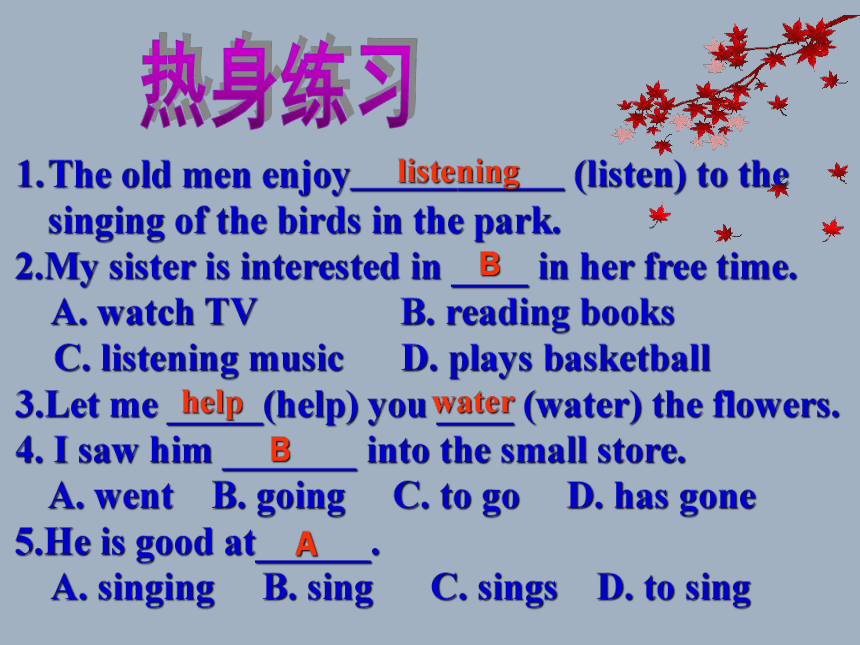
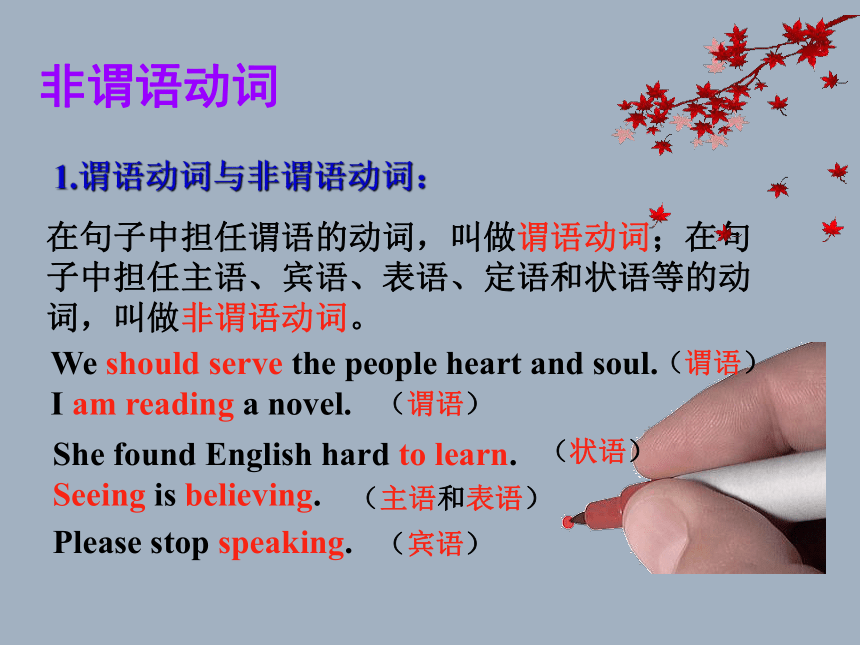
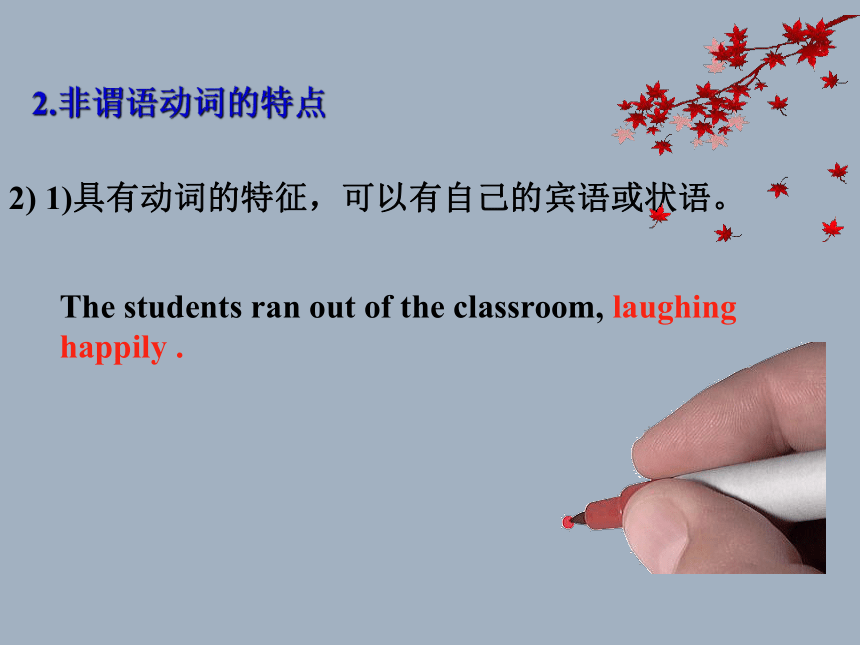
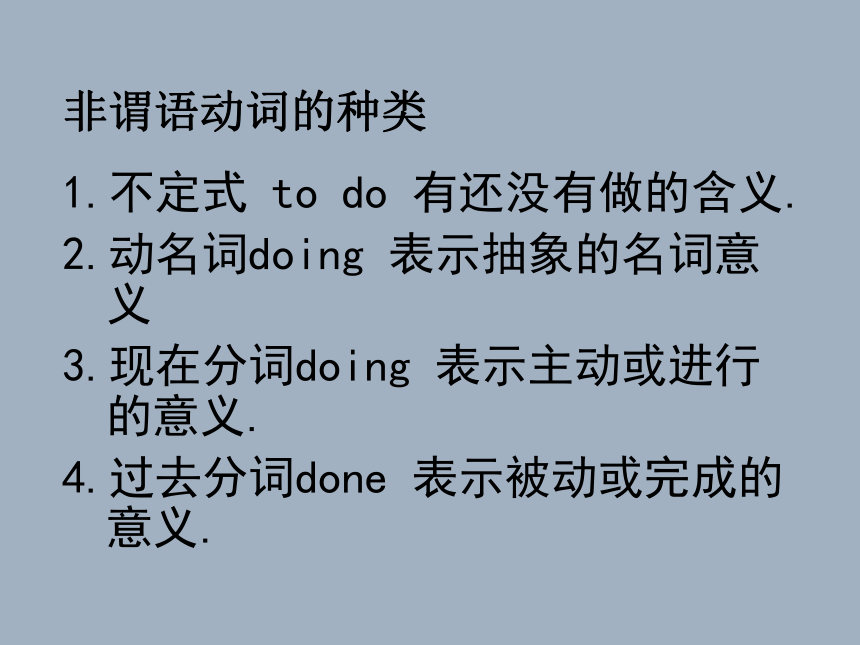
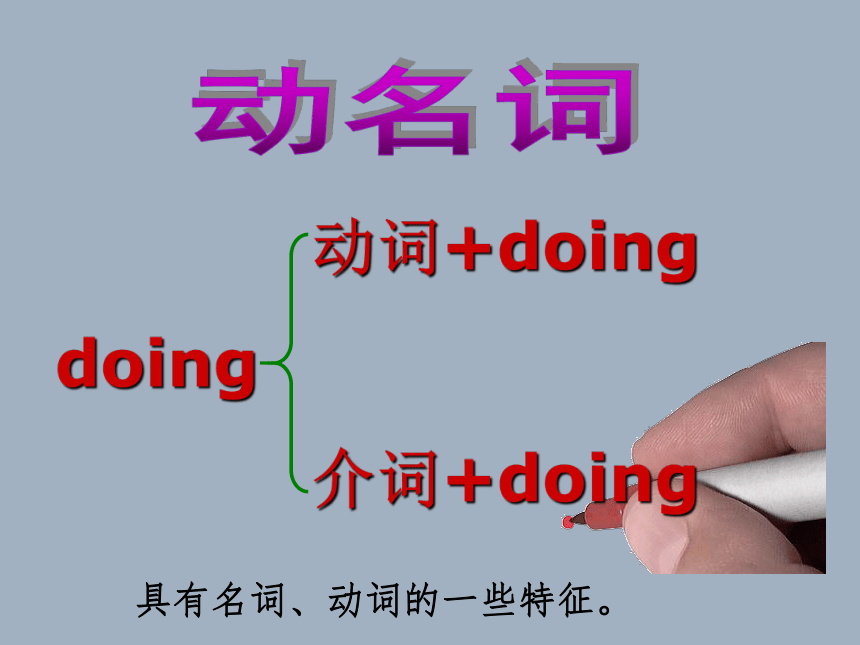
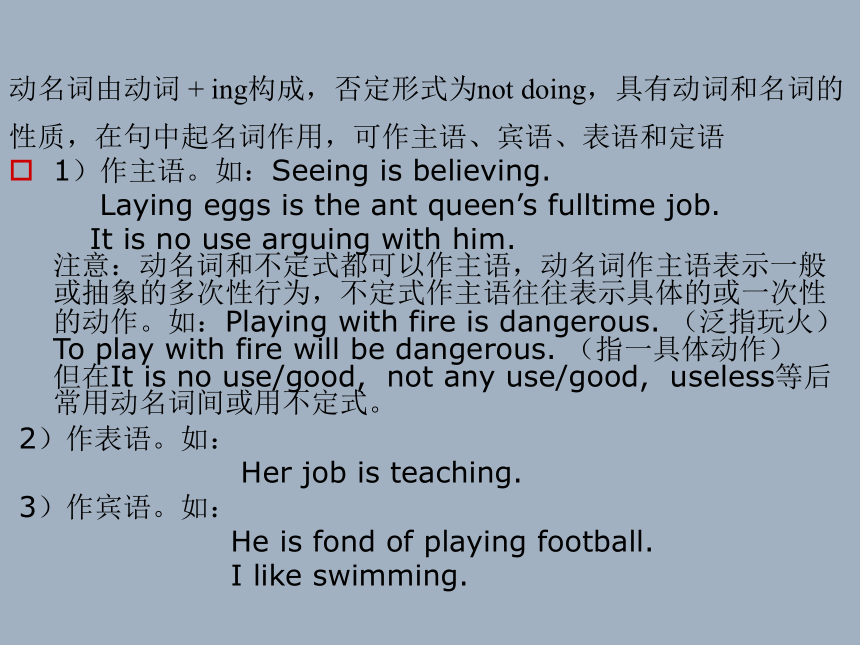

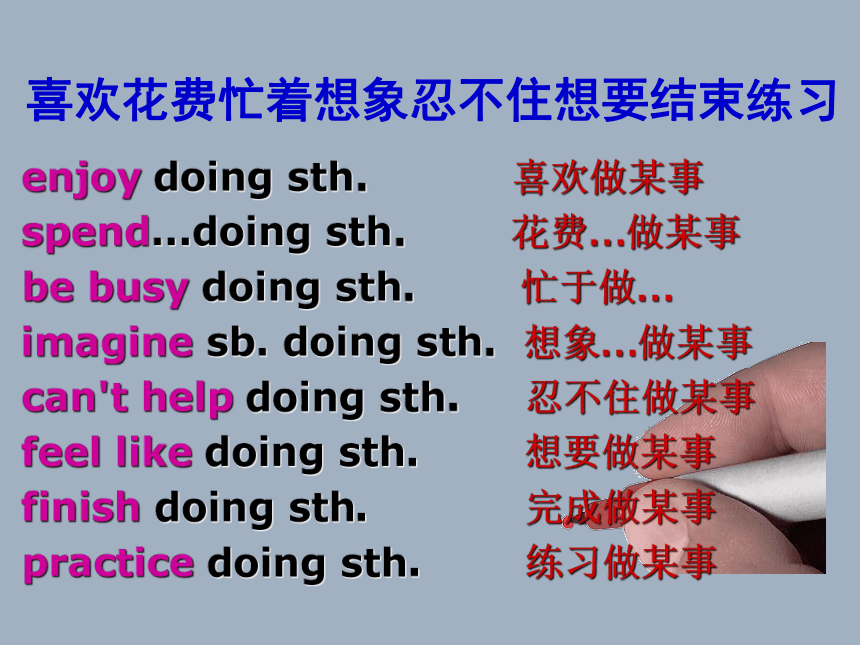
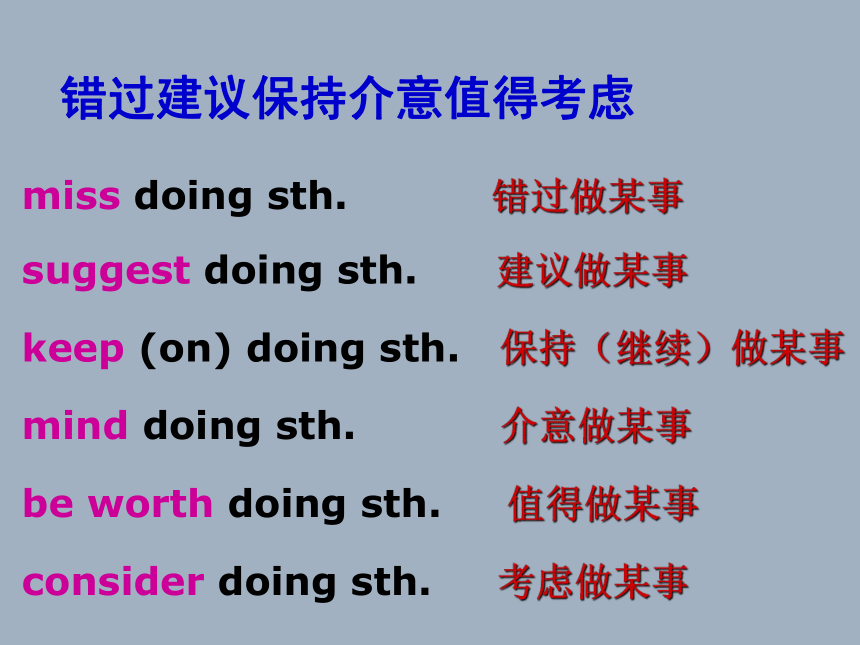
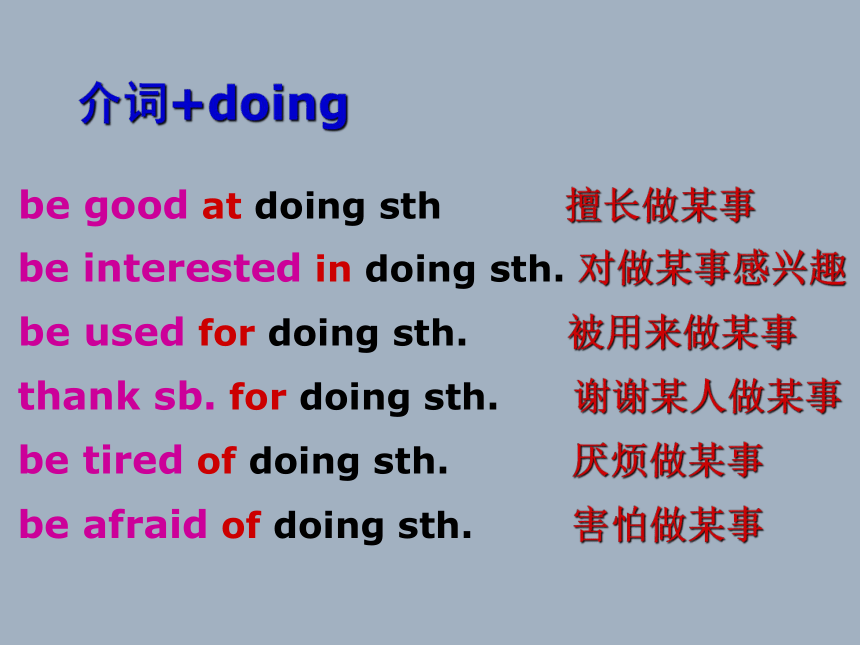
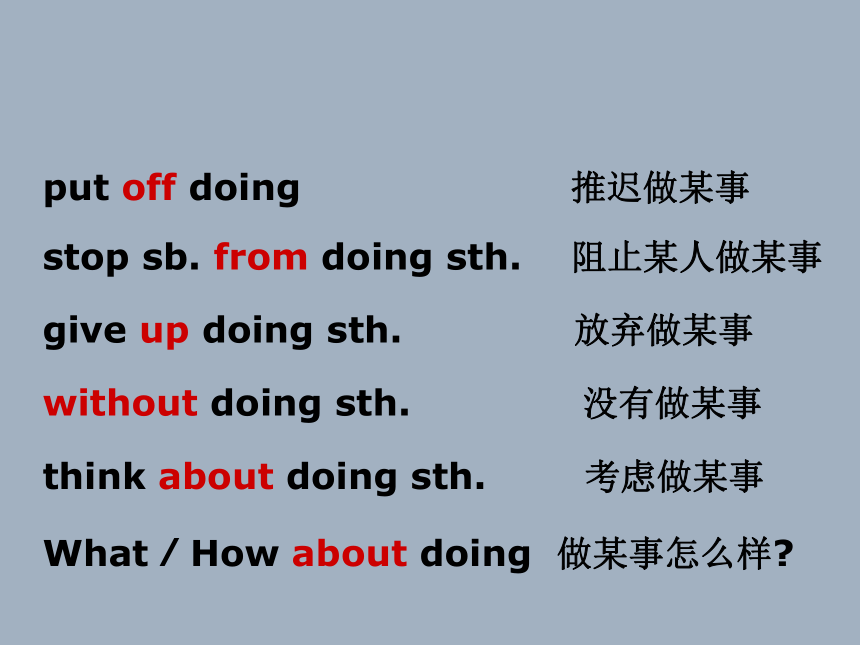
文档简介
课件84张PPT。非谓语动词初中英语语法盛康二中三(4)班
The old men enjoy______________ (listen) to the singing of the birds in the park.
2.My sister is interested in ____ in her free time.
A. watch TV B. reading books
C. listening music D. plays basketball
3.Let me _____(help) you ____ (water) the flowers.
4. I saw him _______ into the small store. A. went B. going C. to go D. has gone
5.He is good at______.
A. singing B. sing C. sings D. to sing
热身练习listeningBBhelpwaterA非谓语动词1.谓语动词与非谓语动词: 在句子中担任谓语的动词,叫做谓语动词;在句
子中担任主语、宾语、表语、定语和状语等的动
词,叫做非谓语动词。We should serve the people heart and soul.
I am reading a novel.She found English hard to learn.
Seeing is believing. Please stop speaking.(谓语) (谓语)(状语)(主语和表语) (宾语)2.非谓语动词的特点 2) 1)具有动词的特征,可以有自己的宾语或状语。 The students ran out of the classroom, laughing happily .非谓语动词的种类1.不定式 to do 有还没有做的含义.
2.动名词doing 表示抽象的名词意义
3.现在分词doing 表示主动或进行的意义.
4.过去分词done 表示被动或完成的意义.
动词+doing
介词+doing doing动名词具有名词、动词的一些特征。动名词由动词?+?ing构成,否定形式为not?doing,具有动词和名词的性质,在句中起名词作用,可作主语、宾语、表语和定语 1)作主语。如:Seeing?is?believing.?
Laying?eggs?is?the?ant?queen’s?fulltime?job.?
It?is?no?use?arguing?with?him.? 注意:动名词和不定式都可以作主语,动名词作主语表示一般或抽象的多次性行为,不定式作主语往往表示具体的或一次性的动作。如:Playing?with?fire?is?dangerous.?(泛指玩火) To?play?with?fire?will?be?dangerous.?(指一具体动作) 但在It?is?no?use/good,??not?any?use/good,??useless等后常用动名词间或用不定式。
2)作表语。如:
Her?job?is?teaching.?
3)作宾语。如:
He?is?fond?of?playing?football.?
I?like?swimming.? 只能接-ing作宾语的动词口诀: 喜欢花费忙着想象忍不住想要结束练习 错过建议保持介意值得考虑喜欢花费忙着想象忍不住想要结束练习 enjoy doing sth. 喜欢做某事
spend...doing sth. 花费…做某事
be busy doing sth. 忙于做…
imagine sb. doing sth. 想象…做某事
can't help doing sth. 忍不住做某事
feel like doing sth. 想要做某事
finish doing sth. 完成做某事
practice doing sth. 练习做某事 miss doing sth. 错过做某事
suggest doing sth. 建议做某事
keep (on) doing sth. 保持(继续)做某事
mind doing sth. 介意做某事
be worth doing sth. 值得做某事
consider doing sth. 考虑做某事
错过建议保持介意值得考虑 be good at doing sth 擅长做某事
be interested in doing sth. 对做某事感兴趣
be used for doing sth. 被用来做某事
thank sb. for doing sth. 谢谢某人做某事
be tired of doing sth. 厌烦做某事
be afraid of doing sth. 害怕做某事 介词+doing put off doing 推迟做某事
stop sb. from doing sth. 阻止某人做某事
give up doing sth. 放弃做某事
without doing sth. 没有做某事
think about doing sth. 考虑做某事
What ∕ How about doing 做某事怎么样? 此to 非彼to look forward to doing sth. (盼望)
pay attention to doing sth. (注意)
be used to doing sth. (习惯于)
prefer doing sth to doing sth.(更喜欢)
devote to doing sth (致力于)
make a contribution to doing(做贡献)小试牛刀1. Now more and more people are busy____about the Internet.
A. learn B. to learn C. learning D. learned
2.-It's too hot. Would you mind _____the door?
-______. Please do it.
A. to open; OK B. opening; Certainly not
C. opening; Of course D. to open; Good idea
3. No matter how hard it is, we'll keep_____until we make it.
A. failed B. failing C. tried D. trying CBD4. -Are you enjoying_____in Ningbo?
-Yes, we are. Very much.
A. to live B. living C. lives D. lived
5.We couldn’t help _____(laugh) after we heard the funny story
A. to laugh B. laughing C. laughs D. laughed
BB1. like doing … 喜欢做某事(习惯性的动作)
2. enjoy doing … 喜欢做某事
3. finish doing … 做完某事
4. mind doing … 介意做某事
5. practice doing … 练习做某事
6. keep (on) doing … 一直、继续、重复做某事
1
7. spend… (in) doing … 花费…做某事
8. stop doing … 停止做某事
9. forget doing … 忘了做过某事
10. remember doing … 想起做过某事11. consider doing … 考虑做某事
12. suggest doing … 建议做某事
13. be busy doing … 忙于、忙着做某事
14. be worth doing … 值得做某事
15. can’t help doing … 禁不住、忍不住做某事
16. have fun doing … 做某事很好玩、很开心
17. have trouble/problem (in) doing … 做某事有困难
18. have a lot of experience (in) doing …
在做…事上很有经验
19. Would you mind doing …? 你介意做…事吗?
20. be good at doing … 擅长于做某事21. do well in doing … 擅长于做某事
22. be afraid of doing … 害怕做某事
23. be interested in doing … 对做…事感兴趣
24. thanks for doing … 为做…事而感谢...
25. end up doing … 结束做某事;以做…事而告终
26. give up doing … 放弃做某事
27. feel like doing … 想要做某事
= want to do …
28. stay up doing … 熬夜做某事
29. be/get used to doing … 习惯做某事
30. make a contribution to doing …
为做…事而做出贡献31. look forward to doing … 期待,盼望做某事
32. What/How about doing …? 做…事怎么样?
33. prevent … from doing … 阻止…做某事;防止…
34. keep … from doing … 防止…
35. stop … from doing … 阻止…做某事;防止…
36. protect … from doing … 保护…免于…;防止…
37. prefer doing … to doing … 和…相比,更喜欢…
38. put off doing … 推迟做某事
39. dream of / about doing … 梦想做某事
40. succeed in doing … 在做…事上成功;做…事成功肯定式: to do
否定式: not to do
省略to的: do动词不定式动词不定式 基本形式:
to+动词原形 (在某些情况下可以不带 to) 特点 :
A .没有人称和数的变化C . 有时态和语态的变化(被动语态的形式为 to be + 动词过去分词)B . 可以有自己的宾语和状语 动词不定式用法A、作主语,如:To learn a foreign language is not easy . = It’s not easy to learn a foreign language.注意1:不定式短语作主语如果太长,常用it作形式主语,将不定式后置。注意2:不定式的逻辑主语: 不定式不能单独做谓语,因此没有语法上的主语,但可以有意义上的逻辑主语。 I promised Tom to play with him.
I asked him to play with me. (to play的逻辑主语是I)
(to play的逻辑主语是him) It is very kind of you to give me some help.
It's impolite of you to speak to the teacher like that.注意:常用在of句型中的adj有:kind, good, nice, wise, unwise, clever, foolish, careless, stupid, naughty (淘气的), polite, impolite,silly, brave, honest, noble,right, rude等 0=You are very kind to give me some help. =you are impolite to speak to the teacher like that. 注意3:同一句型中不同介词的不同含义It is + adj + for sb to do sth
It is + adj + of sb to do sth(for 引出动作发出者)(of 引出adj修饰的对象)在“It is + 形容词 + of sb + 不定式”结构中,形容词往往表示人物的性格和特征,如kind, clever, wrong, right, foolish, stupid, careless, impolite, honest, naughty等。在“It is + 形容词 + for sb + 不定式”结构中,形容词通常表示事物的性质,如important, possible, impossible, difficult, hard等。 比 较 It is good of you to help me with my English. 你真好,帮助我学英语。 (强调you的特征=You are good to help me.) It is good for you to give up smoking. 戒烟对你有好处。 (强调的是give up smoking这一行为= For you to give up smoking is good.)B、作表语,如The important thing is to finish the work on time . 作宾语C、动词 + to do动词+疑问词 + to do 动词 + it(形式宾语)+宾补 +to do常见动词有 agree,decide ,fail, hope, wish , want, plan 等I don’t know what to do .I find it important to learn English. 只能接不定式作宾语的动词口诀: 决定想做计划需要同意,
能做被用来做的事
迫不及待下决心做过去常常未能做的事
决定想做计划需要同意,能做被用来做的事 decide to do sth. 决定做某事
want∕would like to do sth. 想做某事
plan to do sth. 计划做某
need to do sth. 需要做某事
agree to do sth. 同意做某事
afford to do 能做某事
be used to do 被用来做
迫不及待下决心做过去常常未能做的事 can’t wait to do 迫不及待地要做某事
make up one’s mind to do 下决心做某事
used to do 过去常常做某事
fail to do 未能做某事
D、动词不定式作宾语补足语作宾补动词 + 宾语 +to do 动词 + 宾语 + do Li Mei asked me to show her the new dictionary .注:有以上结构的常用动词有 tell. wish, ask, want , like, beg, invite,warn, allow,encourage,advise 等。(不带 to 的不定式)
注:常用的动词是:感官动词see, hear, feel, watch, notice; 使役动词 have ,make,let. 接不定式作宾语补足语的动词口诀: 请求与命令
想要邀请期待鼓励与建议
答应告诫允许提醒和帮助请求与命令 ask sb. to do sth. 请求某人做某事
tell sb. to do sth. 命令某人做某事
想要邀请期待鼓励与建议 want sb. to do sth. 想要某人做某事
invite sb. to do sth. 邀请某人做某事
expect sb. to do sth. 期待某人做某事
encourage sb. to do sth. 鼓励某人做某事
advise sb. to do sth. 建议某人做某事
答应告诫允许提醒和帮助 promise sb. to do 答应某人做某事
warn sb. not to do sth. 告诫某人做某事
allow sb. to do sth. 允许某人做某事
remind sb. to do sth. 提醒某人做某事
help sb. (to) do sth. 帮助某人做某事
F、作定语:(必须后置)I came here to see you.
We were very excited to hear the news.
He hurried to the school to find nobody there .
To look at him,you would like him. (目的) (原因) (结果) (条件) I have some books for you to read. 注意:作定语的不定式如果是不及物动词,或者不定式所修饰的名词或代词是不定式动作的地点工具等,不定式后面须有相应的介词。 He is looking for a room to live in . There is nothing to worry about. Please give me a knife to cut with. G、不定式与疑问词who,which,when,where , how,what等连用,在句中起名词作用,可充当主语表语、宾语等。He didn't know what to say.
My question is when to start.
How to solve the problem is very important
She asked me what to do for today’s homework? (宾语)
Can you teach me how to search the internet? (宾语)
(宾语)
(表语)
(主语) 注意:在与why连用时,只用于why或why not开
头的简短疑问句中,后面紧跟的动词不定式不带to。 Why not have a rest?动词不定式几点注意事项:1、在感官动词和使役动词后作宾补时,不定式可省略to,但以上词变为被动语态时,要加上to, I always saw her play violin .He was made to work 12hours a day. 动词不定式省略to的情况:使役动词和感官动词后:一感二听三让四看:feel/ hear, listen to/ let, make, have, / look at, see, watch, notice
had better(not)do sth. 最好(不)做…
why not /why don’t you do sth 为什么不做…?
help sb.(to)do sth 帮助某人做…
Would rather (not)do sth.宁愿(不)做…
would you please (not)do sth. 请你(不)要做…
情态动词+do 助动词+do一些省略to的句型
(1)Why not +动词原形
(2)Why don’t you+动词原形
(3)You’d better +动词原形
(4)You’d better not +动词原形
(5 ) Will you please +动词原形
(6)Will you please not +动词原形
(7)sb do nothing but(只是,只不过)
例: They didn nothing but complain
感官动词 + doing/to do 感官动词 see, watch, notice, look at, hear, listen to, smell, taste, feel + do 表示动作的完整性,真实性; +doing 表示动作的连续性,进行性 (注意:被动语态中不能省去to。)I saw him work in the garden yesterday.昨天我看见他在花园里干活了。(强调"我看见了"这个事实)
I saw him working in the garden yesterday.昨天我见他正在花园里干活。 (强调“我见他正干活”这个动作)
see sb. doing/ do sth.
hear sb. doing/ do sth.
watch sb. doing/ do sth.
notice sb. doing/ do sth.
特殊词精讲:动名词与不定式语义不同stop to do
forget to do
remember to do
regret to do
cease to do
try to do
go on to do
Be afraid to do
mean to do stop doing
forget doing
remember doing
regret doing
cease doing
try doing
go on doing
Be afraid doing
mean doing 1) stop doing/to do
stop to do 停止,中断做某事后去做另一件事。
stop doing 停止做某事。
They stop to smoke a cigarette. 他们停下来,抽了根烟。
I must stop smoking. 我必须戒烟了。
典型例题
She reached the top of the hill and stopped ___ on a big rock by the side of the path.
A. to have rested B. resting C. to rest D. rest
答案:C。由题意可知,她到了山顶,停下来在一个路边的大石头上休息。因此,应选择“stop to do sth. 停下来去做另一件事”。而不仅仅是爬山动作的终止,所以stop doing sth.不正确。
2) forget doing/to do
forget to do 忘记要去做某事。 (未做)
forget doing 忘记做过某事。 (已做)
The light in the office is stil on. He forgot to turn it off.
办公室的灯还在亮着,它忘记关了。(没有做关灯的动作)
He forgot turning the light off.
他忘记他已经关了灯了。 ( 已做过关灯的动作)
典型例题
---- The light in the office is still on. ---- Oh,I forgot___.
A. turning it off B. turn it off C. to turn it off D. having turned it off
答案:C。由the light is still on 可知灯亮着,即关灯的动作没有发生,因此用forget to do sth. 而forget doing sth表示灯已经关上了,而自己忘记了这一事实。此处不符合题意。3) remember doing/to do
remember to do 记得去做某事 (未做)
remember doing 记得做过某事 (已做)
Remember to go to the post office after school. 记着放学后去趟邮局。
Don't you remember seeing the man before? 你不记得以前见过那个人吗?
4) try doing/to do
try to do 努力,企图做某事。
try doing 试验,试着做某事。
You must try to be more careful.你可要多加小心。
I tried gardening but didn't succeed. 我试着种果木花卉,但未成功。5) go on doing/to do
go on to do 做了一件事后,接着做另一件事。
go on doing 继续做原来做的事。
After he had finished his maths,he went on to do his physics. 做完数学后,他接着去做物理。
6) be afraid doing/to do
be afraid to do 不敢,胆怯去做某事,是主观上的原因不去做,意为"怕";
be afraid of doing 担心出现doing的状况、结果。 doing 是客观上造成的,意为“生怕,恐怕”。
She was afraid to step further in grass because she was afraid of being bitten by a snake. 她生怕被蛇咬着,而不敢在草丛中再走一步。
She was afraid to wake her husband. 她不敢去叫醒她丈夫。
She was afraid of waking her husband. 她生怕吵醒她丈夫。
2、动词不定式的否定形式为:
not + to doMr.Smith asked the boy ___________(not play) this kind of game. not to playPlease have him __________(not do) so much housework. not do3、动词不定式可以在句子中用作定语,放在名词或代词后面。 They could not find a place to live in.(他们找不到住的地方 Please give me a chair to sit on.(请给我一张椅子坐坐) 4、不定式作表语形容词的状语,和句中的主语构成逻辑上的动宾关系时,不定式多用主动形式,这是因为人们往往认为形容词后省去了for one或for people. He is hard to talk to. The book is difficult to understand. The question is easy to answer不定式的时态1)不定式的一般形式所表示的动作,通常与谓语的动作(状态)同时(或几乎同时)发生,或是在它之后发生。例如:I?saw?him?go?out.?
2)如果谓语表示的动作(情况)发生时,不定式表示的动作正在进行,这时不定式就要用进行式。例
He?pretended?to?be?reading?a?book?when?she?went?in.?
3)如果不定式的动作发生在谓语动词之前,就要用完成式。例如: I’m?sorry?to?have?kept?you?waiting.?1. like to do … 喜欢做某事(多指一次性的动作)
dislike/hate to do … 不喜欢/讨厌做某事
2. be allowed to do … 被允许做某事
3. would like to do … 想做某事
4. want to do … 想做某事
5. try to do ….试图,尽力做某事
6. agree to do … 同意做某事
disagree to do …不同意做某事
7. attempt to do 企图做某事
8. begin to do … 开始做某事
9. start to do … 开始做某事
10. decide to do … 决定做某事 11. refuse to do …拒绝做某事
12. stop to do … 停下来去做另一件事
13. forget to do … 忘记去做某事
14. remember to do … 记着去做某事
15. hope to do …希望做某事
16. wish to do … 希望做某事
17. learn to do …学习做某事
18. fail to do … 做某事失败
19. plan to do … 计划去做某事
20. seem to do … 似乎,好像要做某事 22. make/be sure to do … 确定去做某事
23. need to do … 需要做某事
24. offer to do … 提供做某事
25. prefer to do … 更愿意/想/喜欢做某事
26. pretend to do … 假装做某事
27. volunteer to do … 志愿去做某事
28. afford to do … 负担得起做某事
29. expect to do … 期待去做某事
30. hurry to do … 匆忙去做某事
31. rush to do … 立刻,马上去做某事32. choose to do … 选择做某事
33. tell sb. to do … 告诉某人做某事
34. ask sb. to do … 要求/让某人做某事
35. want sb. to do … 想让某人做某事
36. would like sb. to do … 想让某人做某事
37. get sb. to do … 让某人做某事
38. teach sb. to do … 教某人做某事
39. wish sb. to do … 希望某人做某事
40. allow sb. to do … 允许某人去做某事41. encourage sb. to do … 鼓励某人做某事
42. invite sb. to do … 邀请某人去做某事
43. order sb. to do … 命令某人去做某事
44. help sb. (to) do …帮助某人某事
45. have time to do … 有时间做某事
46. used to do … 过去常常做某事
47. get/have a chance to do …
得到/有一个机会做某事
= get/have an opportunity to do …
48. make it possible for sb to do …
使得有可能去做某事
49. try/do one’s best to do …
尽最大努力去做某事
50. make up one’s mind to do … 下定决心做某事
=make a decision to do 决定做某事
=decide to do … 决定做某事51. be supposed to do …
应该做某事 = should do…
52. be willing to do … 愿意做某事
53. in order to do … 为了做某事…
54. It’s time to do …. 到该做某事的时间了。
55. take time to do … 花时间去做某事
56. It takes sb. some time to do …
花某人时间去做某事
57. It’s + adj. + for/of sb. to do ….
对于某人来说做 … 是 ... 的。
58. prefer to do… rather than do…
宁愿做 … 而不愿做 …
59. go out of one’s way to do… 设法去做某事
60. continue to do … / doing … 继续做某事现在分词与过去分词两者之间的区别主要体现在时态和语态上:
1.在时态上:现在分词表示正在进行,而过去分词表示已经完成。
2.在语态上:现在分词表示主动;而过去分词表示被动。
总之,现在分词表主动、进行;
过去分词表被动、完成。
在句法功能上它们都可以作定语、表语、状语和宾补,它们的具体区别如下:分词1. 现在分词单独作定语,通常放在所修饰词前。例如: The sleeping boy is Tom.
2. 现在分词短语作定语放在所修饰词的后面,意思同定语从句差不多。例如 :
the man standing by the windows is our teacher.站在门边的人是我们的老师。
The house built last year has become our lab. 去年建的房子已成了我们的实验室。
The meeting held last week is very important.
Tell the children playing there not to make so much noise.
They lived in a room facing (= that faced) the south.
I hate to see letters written in pencil.
1、作定语时1.现在分词表示正在进行;过去分词表示已经完成。
developing country 发展中国家(正在发展的)
developed country 发达国家(已发展的)
boiling water沸水(正在沸腾的水)
boiled water 开水(已烧开了的水,可能已凉了)
falling leaves 正在飘落的树叶
fallen leaves 落叶(已落下的树叶)
现在分词强调动作正在进行,侧重于主动。
过去分词强调动作已经完成,侧重于被动;
2.现在分词表示主动;过去分词表示被动。例如:
a moving film 一部感人的电影 (主动)
the moved people 被感动的人们 (被动)
现在分词表示“令人感到…”,指主语和被修饰词给人
的感觉,过去分词表示“感到…”,指主语和被修饰词
的感觉。
an exciting game 一场令人感到激动的比赛
the excited people 感到激动的人们
?He saw a ________ bird and raised his bow. A. fly B. flying ?C. flew D. to be flying 分析: B 。表示正在进行的动作,句意是:正在飞的鸟。此处的 a flying bird = a bird which was flying 。
I was satisfied with the _____ speech. A. excite B. exciting C. excited D. be excited 分析: B 。表示被修饰词 speech 的性质和特征,此处的 the exciting speech = the speech that/which was exciting 。
2、作表语时共同点:分词作表语时,它起着形容词的作用。
不同点:分词作表语时,句子的主语就是该分词的逻辑主语。但现在分词作表语时,与其逻辑主语之间是主动关系,所表示的动作的一般与句中谓语动词所表示的动作同时发生;而过去分词则表示被动关系,所示动作一般发生在谓语动词之前或同时发生。 1. -How did Bob do in the exams this time?
-Well, his father seems ____ with his results.
A. pleasing B. please C. pleased D. to please
2. -How did the audience receive the new play?
-They got very ____.
A . excite B . excited C . Excitedly D . exciting
简析:首先, 根据语法分析可知, 待选部分在句中应作表语。因为 seems 在此句中用作连系动词; 再根据 his father 对于动词 please 来说应是被动关系, 即这个结果使他的父亲高兴; 换言之, 他的父亲因为受到这个结果的刺激而感到高兴。因此, 该题应选C。简析:该题应选B。测试他们被那出新戏所打动。
3、作宾语补足语时现在分词与句子的宾语是主动关系,它所表示的动作往往正在进行;
过去分词与句子的宾语是被动关系,它所表示的动作往往已经完成。I found them painting the windows. (现在分词表主动、进行)
I found the windows painted. (过去分词表被动、完成)牛刀小试
1.?My mother often asks me __ some cleaning on Sundays
A do B. does C. did D. to do
2.?–Do you often hear John ___in his room ?
– Listen! Now we can hear him __ in his room .
A. sing , to sing B. sing, sing
C. sing , singing D. to sing , singing DC3.?I watched her__in the next room last night.
A.dancing B. to dance C. dances D. dance
4.Let’s ____swimming after the exam .
A.go B. goes C. to go D. went
5.?You’d better ___a bus .
A.to catch B. catch C. catches D. catching
DAB1.I didn’t spend al the money _______(buy) the books.2. Do you have anything ________(say) at the meeting?3. Yesterday I saw a wallet ________(lie) on the ground .4.The man ran out ________(see) what was wrong .5. She was often heard _________(sing) in English.6. Stop ________(read), please.I’ve something to tell you .7. The boy _______(call) Li Hua in the room is his brother.buyingto saylying to see to singreadingcalled用所给词的正确形式填空8. The girl __________(stand) under the tree is my cousin Kate.
9. Books __________ (write) in easy English are very popular among Chinese middle school students.
10. Why did you keep your brother __________ (wait) for a long time that evening?
11. I prefer __________(read) books at home rather than __________(go) shopping on Sundays.
12. He didn’t finish __________(write) the book until last week.
13. Li Lei is asking his uncle, an English teacher, ________(help) him think of a foreign name.
standingwrittenwaitingto readgowritingto help拓展精练1.Martin looks so well. We’ve never seen him ____ so well before.
A. is looked B. is looking C. to look D. look
2.My father has decided ____ because smoking is bad for his health.
A. to stop to smoke B. to stop smoking
C. stopping smoking D. stop to smoke
3 It is kind ___ me to carry these books.
A. of you helping B. for you to help
C. of you to help D. for you helpingDBC4 —Would you like ______ some bread or biscuits?
—No thanks. I don’t feel like _____ anything now.
A. to have, eating B. to have, to eat
C. having, to eat D. having, eating
5. — Do you remember me, Tom?
— Ah, yes, I remembered _____ you in JUSCO last year.
A. see B. sees C. to see D. seeing
AD6.We are interested in _______ to swim.
A. study B. studying C. learn D. learning
7.My grandfather wants _____around the world because he enjoys _____new places.
A. traveling , seeing B. to travel , to see
C. to travel, seeing D. traveling ,to seeDC8. Jack gives me a piece of paper___.
A. to write B. to write on
C. to write at D. to write in
9. Let’s make a fire _____ ourselves up.
A. to warm B. warming C. warm D. warmed
10.When I was walking in the field, I saw a plane ___over my head.
A. flew B. flies C. flying D. fling
BAC11.?Thank you for us so well .
A. to teach B. teaches C. taught D. teaching
12.?? I often do some on Sundays.
A. washed B. to wash C. washing D. washes
13.?? The boy Jack in Class One is my brother.
A. call B. to be called C. calling D. called
14.??It often takes me half an hour home.
A. walking B. to walk C. walked D. walks
15.?? Don’t forget her clean water every day .
A. to give B. giving C. given D. give
DCDBA?16. I think it is important English well .
A. learning B. learn
C. to learn D. learned
17. The funny story made us all hard .
A. laugh B. to laugh C. laughing D. laughed
18.?? Our teacher told us hard at our lessons .
A. to work B. work C. working D. worked
19. Could you tell me this newspaper ?
A. to read how B. how to read
C. what to read D. what read
CAAB20. I don’t know next .
A. what to do B. what to do it
C. how to do D. to how do it
21.? My hair is too long , so I must have it this afternoon.
A.cut B. cuts C. cutting D. cutted
22.?Remember last for class again .
A. not to B. be not to
C. not to be D. not to come
23.? Mr Smith asked the man the queue .
A. not jump B. didn’t jump
C. not to jump D. to not jump
AACC?14.Why not with us ? You see , it’s very .
A. go ; interested B. go; interesting
C. to go ; interested D. going ; interesting
15.– What about to the cinema tonight ?
--That’s a good idea. I’d like with you .
A. going ; going B. to go ; to go
C. going ; to go D. go ; going
16.Everyone here is busy read for the coming entrance tests .
A. get B. to get C. getting D. gets
BCC17.we’ve worked for two hours . Let’s a rest .
A. stop to have B. stop having
C. to stop to have D .stopping having
18.?? Would you mind me a favour(恩惠)?
A. do B. to go C. doing D. did
19.?? Mr Wang asked me him .
A. help B. helps C. to help D. helping
20.?? Please tell Jim not late again .
A. to B. be C. to be D. be to
ACCC23.Please don’t forget to me , will you ?
A. to write B. writing C. write
22.The boy wants his father a question about the moon .
A. asking B. to ask C. ask D. asked21.Miss Yang asked the boy , the baby was sleeping in the room .
A. to stop to sing B. to stop singing
C. stop singing D. stop to singBBA?25.?It’s about six o’clock, Let’s — supper now .
A. stop having B. to stop having
C. stop to have D. to stop to have
26.We’d better — on the road . A car may hit us .
A. not to play B. not play
C. to not play D. don’t play24.?? Mother decided — Tom away from school .
A. to keep not B. keep not
C. not to keep D. not keep CCBA.??27.?? Liu Mei helped the Turners — their tickets on the train .
A. pick B. look up C. pick up D. look like
28.?? I often see them — with some foreigners .
A. talk B. to talk C. talking D. talked CA29.— Do you still remember me somewhere Beijing ?
— Yes ,of course . Two years ago .
A.?to see B. see C. seeing D. saw
30.?Parents must warn their children — .
A. to play with fire B. not to play with fire
C. of playing fire D. playing fire
CB1.?????? 31.This morning I saw a man on the street on my way .
A.lives ; there B. lived ; to school
C. lying ; to school D. to lie ; home .
32.He has given up tennis since he was ill .
A.play B. to play C. playing D.plays
33. ----Will you come to the net bar with me ?
---- Sorry , My mother always tells me there .
A. not go B. not to go C. go D. to go CCB34. --- What’s the language __ in New Zealand?
--- English.
A. speaking B. spoken C. be spoken D. to speak
35. Paul doesn’t have to be made _______. He always works hard.
A. learn B. to learn C. learned D. learning
36. The house is not big enough for us all _______.
A. to live in B. to be lived in C. to live D. for living in
BBA37. The teacher asked the students to close the windows ___ the wind from ___ the papers away.
A. to stop; blowing B. stopping; blowing
C. to stop; blow D. stopped; blow
38. We should do as much as we can _____water.
A. for saving B. to save C. save D. saved
39. There are many people ___ to buy cars in the modern world.
A. want B. wanted C. wanting D. to want
ABC40. The little boy woke up his father, ____ “Happy Birthday!”
A. call B. to call C. called D. calling
41. The car __ in Germany in the 1960s looks old now.
A. produced B. producing
C. to produce D. which produced
42. --- What are on show in the museum?
--- Some pictures _______ by the Africans.
A. drawing B. drawn C. drew D. were drawn
DAB43. --- The boy was seen ___ his bike a moment ago.
--- I am sorry to hear that.
A. fell off B. to fall off C. fall off D. to fall down
44. -- You’d better have your sports jacket ___. It’s too dirty.
--- Thanks. I will.
A. to wash B. washed C. washing D. wash
45. The words _______ with “L” aren’t easily forgotten.
A. starting B. started C. to start D. whose starting
BBA46. Have you read this book? It’s worth _______.
A. to read B. read C. reading D. to be read
47. Yesterday I heard a story ____ by my friend.
A. told B. telling C. to tell D. tell
48. --- What do you come here for? --- _______.
A. Borrow a CD B. To borrow a CD
C. Borrowing a CD D. Borrowed a CD
CAB1. When I got there I found many people _____ (work) there.
2. Martin’s mother didn’t give up _______ (try) to help him.
3. The teacher couldn’t stop _______ (laugh) when the boy came in with a flower in his hand.
4. He should stop _______ (work) at night. He is so tired.
5. Young people need _____ (sleep) about at least 8 hours every day.
6. We should pass the test instead of ______ (fail) the test.
7. I would rather____ (read) English than ____ (write) words.
8. Don’t let his words _______ (bother) you.
9. We have studied for more than 2 hours. Let’s stop ______ (have) a rest.
10. Who can choose_____ (give) up studying this kind of topic?
11. I’m ____ (terrify) of ______ (stay) at home alone at night.
12. Are you afraid of _________ (go) out at night?
13. You must stop him from _____ (smoke), or his health can get worse and worse.
14. I’m interested in ________ (paint) pictures.
15. They are all ______ (will) to _______ (help) the poor. 16. We hope ______ (go) to the museum with our teacher this week.
17. Jim spent two hours ________ (draw) that house.
18. I _____ (use) to study English by _____ (read) English novels.
19. He was ill yesterday, so he didn't feel like ______ (eat) anything.
20. The students are busy ________ (get) ready for the test.
21. Can you tell me how ________ (chat) on the Internet?
22. Those workers were made ________ (work) the whole night.
23. I found it very difficult _______ (get) to learn French.
24. It is used for_______ (scoop) the cold ice cream.
25. The chairs are used for __________ (sit) on.
26. After two hours' discussion, the manager decided ____ (end) the
meeting.
27. Qingdao is one of the best places for_____ (surf) in China.
28. _______ (learn) a foreign language is not easy.
29. Animals are our friends. We must try our best _______ (save) the endangered animals.
30. He always makes me _______ (wait) for him.31. He always keeps me _______ (wait) for him.
32. Young people have fun _______ (fly) kites outside.
33.Bob was seen __ (walk) with a beautiful girl in the park yesterday.
34. --Would you please tell me how ____ (do) it next?
--Think it over. You’ll find a good way.
35. His parents often encourage him _____ (work) hard.
36. --John, my computer doesn’t work.
--Why not ask Mr. Liu ____ (check) it for you?
37. –What’s your plan for the summer holidays?
--I’ve no idea, but I’ve decided ___ (stay) at home and __ (have)
a good rest first.
38. We are going for a picnic tomorrow. I’ll call Wendy to make sure when ________ (start).
39. --My brother’s ill in hospital. --I’m sorry _________ (hear) that.
40. Could you tell me if the plan includes ______ (visit) the Summer Palace?
41. Last week our geography teacher told us ______ (get) more information
about how ______ (protect) the environment.
42. All the hats look beautiful. I don’t know which one _____(choose). 43. Last week I met my old friend Li Ming but I forgot ______ (ask) him for his telephone number.
44. My mother asks me ______ (not watch) TV before ______(finish) my homework.
45. --How do you feel when you watch the national flag go up?
--It makes me _______ (feel) very proud.
46. -- What a heavy rain!
-- So it is. I prefer _____ (watch) TV at home to ________ (go) out on such a rainy day.
47. It seems that it is going to rain. You’d better _______ (not leave) the
48 window open when you leave the house.
49 I’ve got used to ________ (eat) the food in China. And I find it is quite delicious.
50 My father used to ________ (live) in the countryside. Now he lives in a big city.
51 If everyone makes a contribution to ________ (protect) the environment, our country will become more and more beautiful.end
The old men enjoy______________ (listen) to the singing of the birds in the park.
2.My sister is interested in ____ in her free time.
A. watch TV B. reading books
C. listening music D. plays basketball
3.Let me _____(help) you ____ (water) the flowers.
4. I saw him _______ into the small store. A. went B. going C. to go D. has gone
5.He is good at______.
A. singing B. sing C. sings D. to sing
热身练习listeningBBhelpwaterA非谓语动词1.谓语动词与非谓语动词: 在句子中担任谓语的动词,叫做谓语动词;在句
子中担任主语、宾语、表语、定语和状语等的动
词,叫做非谓语动词。We should serve the people heart and soul.
I am reading a novel.She found English hard to learn.
Seeing is believing. Please stop speaking.(谓语) (谓语)(状语)(主语和表语) (宾语)2.非谓语动词的特点 2) 1)具有动词的特征,可以有自己的宾语或状语。 The students ran out of the classroom, laughing happily .非谓语动词的种类1.不定式 to do 有还没有做的含义.
2.动名词doing 表示抽象的名词意义
3.现在分词doing 表示主动或进行的意义.
4.过去分词done 表示被动或完成的意义.
动词+doing
介词+doing doing动名词具有名词、动词的一些特征。动名词由动词?+?ing构成,否定形式为not?doing,具有动词和名词的性质,在句中起名词作用,可作主语、宾语、表语和定语 1)作主语。如:Seeing?is?believing.?
Laying?eggs?is?the?ant?queen’s?fulltime?job.?
It?is?no?use?arguing?with?him.? 注意:动名词和不定式都可以作主语,动名词作主语表示一般或抽象的多次性行为,不定式作主语往往表示具体的或一次性的动作。如:Playing?with?fire?is?dangerous.?(泛指玩火) To?play?with?fire?will?be?dangerous.?(指一具体动作) 但在It?is?no?use/good,??not?any?use/good,??useless等后常用动名词间或用不定式。
2)作表语。如:
Her?job?is?teaching.?
3)作宾语。如:
He?is?fond?of?playing?football.?
I?like?swimming.? 只能接-ing作宾语的动词口诀: 喜欢花费忙着想象忍不住想要结束练习 错过建议保持介意值得考虑喜欢花费忙着想象忍不住想要结束练习 enjoy doing sth. 喜欢做某事
spend...doing sth. 花费…做某事
be busy doing sth. 忙于做…
imagine sb. doing sth. 想象…做某事
can't help doing sth. 忍不住做某事
feel like doing sth. 想要做某事
finish doing sth. 完成做某事
practice doing sth. 练习做某事 miss doing sth. 错过做某事
suggest doing sth. 建议做某事
keep (on) doing sth. 保持(继续)做某事
mind doing sth. 介意做某事
be worth doing sth. 值得做某事
consider doing sth. 考虑做某事
错过建议保持介意值得考虑 be good at doing sth 擅长做某事
be interested in doing sth. 对做某事感兴趣
be used for doing sth. 被用来做某事
thank sb. for doing sth. 谢谢某人做某事
be tired of doing sth. 厌烦做某事
be afraid of doing sth. 害怕做某事 介词+doing put off doing 推迟做某事
stop sb. from doing sth. 阻止某人做某事
give up doing sth. 放弃做某事
without doing sth. 没有做某事
think about doing sth. 考虑做某事
What ∕ How about doing 做某事怎么样? 此to 非彼to look forward to doing sth. (盼望)
pay attention to doing sth. (注意)
be used to doing sth. (习惯于)
prefer doing sth to doing sth.(更喜欢)
devote to doing sth (致力于)
make a contribution to doing(做贡献)小试牛刀1. Now more and more people are busy____about the Internet.
A. learn B. to learn C. learning D. learned
2.-It's too hot. Would you mind _____the door?
-______. Please do it.
A. to open; OK B. opening; Certainly not
C. opening; Of course D. to open; Good idea
3. No matter how hard it is, we'll keep_____until we make it.
A. failed B. failing C. tried D. trying CBD4. -Are you enjoying_____in Ningbo?
-Yes, we are. Very much.
A. to live B. living C. lives D. lived
5.We couldn’t help _____(laugh) after we heard the funny story
A. to laugh B. laughing C. laughs D. laughed
BB1. like doing … 喜欢做某事(习惯性的动作)
2. enjoy doing … 喜欢做某事
3. finish doing … 做完某事
4. mind doing … 介意做某事
5. practice doing … 练习做某事
6. keep (on) doing … 一直、继续、重复做某事
1
7. spend… (in) doing … 花费…做某事
8. stop doing … 停止做某事
9. forget doing … 忘了做过某事
10. remember doing … 想起做过某事11. consider doing … 考虑做某事
12. suggest doing … 建议做某事
13. be busy doing … 忙于、忙着做某事
14. be worth doing … 值得做某事
15. can’t help doing … 禁不住、忍不住做某事
16. have fun doing … 做某事很好玩、很开心
17. have trouble/problem (in) doing … 做某事有困难
18. have a lot of experience (in) doing …
在做…事上很有经验
19. Would you mind doing …? 你介意做…事吗?
20. be good at doing … 擅长于做某事21. do well in doing … 擅长于做某事
22. be afraid of doing … 害怕做某事
23. be interested in doing … 对做…事感兴趣
24. thanks for doing … 为做…事而感谢...
25. end up doing … 结束做某事;以做…事而告终
26. give up doing … 放弃做某事
27. feel like doing … 想要做某事
= want to do …
28. stay up doing … 熬夜做某事
29. be/get used to doing … 习惯做某事
30. make a contribution to doing …
为做…事而做出贡献31. look forward to doing … 期待,盼望做某事
32. What/How about doing …? 做…事怎么样?
33. prevent … from doing … 阻止…做某事;防止…
34. keep … from doing … 防止…
35. stop … from doing … 阻止…做某事;防止…
36. protect … from doing … 保护…免于…;防止…
37. prefer doing … to doing … 和…相比,更喜欢…
38. put off doing … 推迟做某事
39. dream of / about doing … 梦想做某事
40. succeed in doing … 在做…事上成功;做…事成功肯定式: to do
否定式: not to do
省略to的: do动词不定式动词不定式 基本形式:
to+动词原形 (在某些情况下可以不带 to) 特点 :
A .没有人称和数的变化C . 有时态和语态的变化(被动语态的形式为 to be + 动词过去分词)B . 可以有自己的宾语和状语 动词不定式用法A、作主语,如:To learn a foreign language is not easy . = It’s not easy to learn a foreign language.注意1:不定式短语作主语如果太长,常用it作形式主语,将不定式后置。注意2:不定式的逻辑主语: 不定式不能单独做谓语,因此没有语法上的主语,但可以有意义上的逻辑主语。 I promised Tom to play with him.
I asked him to play with me. (to play的逻辑主语是I)
(to play的逻辑主语是him) It is very kind of you to give me some help.
It's impolite of you to speak to the teacher like that.注意:常用在of句型中的adj有:kind, good, nice, wise, unwise, clever, foolish, careless, stupid, naughty (淘气的), polite, impolite,silly, brave, honest, noble,right, rude等 0=You are very kind to give me some help. =you are impolite to speak to the teacher like that. 注意3:同一句型中不同介词的不同含义It is + adj + for sb to do sth
It is + adj + of sb to do sth(for 引出动作发出者)(of 引出adj修饰的对象)在“It is + 形容词 + of sb + 不定式”结构中,形容词往往表示人物的性格和特征,如kind, clever, wrong, right, foolish, stupid, careless, impolite, honest, naughty等。在“It is + 形容词 + for sb + 不定式”结构中,形容词通常表示事物的性质,如important, possible, impossible, difficult, hard等。 比 较 It is good of you to help me with my English. 你真好,帮助我学英语。 (强调you的特征=You are good to help me.) It is good for you to give up smoking. 戒烟对你有好处。 (强调的是give up smoking这一行为= For you to give up smoking is good.)B、作表语,如The important thing is to finish the work on time . 作宾语C、动词 + to do动词+疑问词 + to do 动词 + it(形式宾语)+宾补 +to do常见动词有 agree,decide ,fail, hope, wish , want, plan 等I don’t know what to do .I find it important to learn English. 只能接不定式作宾语的动词口诀: 决定想做计划需要同意,
能做被用来做的事
迫不及待下决心做过去常常未能做的事
决定想做计划需要同意,能做被用来做的事 decide to do sth. 决定做某事
want∕would like to do sth. 想做某事
plan to do sth. 计划做某
need to do sth. 需要做某事
agree to do sth. 同意做某事
afford to do 能做某事
be used to do 被用来做
迫不及待下决心做过去常常未能做的事 can’t wait to do 迫不及待地要做某事
make up one’s mind to do 下决心做某事
used to do 过去常常做某事
fail to do 未能做某事
D、动词不定式作宾语补足语作宾补动词 + 宾语 +to do 动词 + 宾语 + do Li Mei asked me to show her the new dictionary .注:有以上结构的常用动词有 tell. wish, ask, want , like, beg, invite,warn, allow,encourage,advise 等。(不带 to 的不定式)
注:常用的动词是:感官动词see, hear, feel, watch, notice; 使役动词 have ,make,let. 接不定式作宾语补足语的动词口诀: 请求与命令
想要邀请期待鼓励与建议
答应告诫允许提醒和帮助请求与命令 ask sb. to do sth. 请求某人做某事
tell sb. to do sth. 命令某人做某事
想要邀请期待鼓励与建议 want sb. to do sth. 想要某人做某事
invite sb. to do sth. 邀请某人做某事
expect sb. to do sth. 期待某人做某事
encourage sb. to do sth. 鼓励某人做某事
advise sb. to do sth. 建议某人做某事
答应告诫允许提醒和帮助 promise sb. to do 答应某人做某事
warn sb. not to do sth. 告诫某人做某事
allow sb. to do sth. 允许某人做某事
remind sb. to do sth. 提醒某人做某事
help sb. (to) do sth. 帮助某人做某事
F、作定语:(必须后置)I came here to see you.
We were very excited to hear the news.
He hurried to the school to find nobody there .
To look at him,you would like him. (目的) (原因) (结果) (条件) I have some books for you to read. 注意:作定语的不定式如果是不及物动词,或者不定式所修饰的名词或代词是不定式动作的地点工具等,不定式后面须有相应的介词。 He is looking for a room to live in . There is nothing to worry about. Please give me a knife to cut with. G、不定式与疑问词who,which,when,where , how,what等连用,在句中起名词作用,可充当主语表语、宾语等。He didn't know what to say.
My question is when to start.
How to solve the problem is very important
She asked me what to do for today’s homework? (宾语)
Can you teach me how to search the internet? (宾语)
(宾语)
(表语)
(主语) 注意:在与why连用时,只用于why或why not开
头的简短疑问句中,后面紧跟的动词不定式不带to。 Why not have a rest?动词不定式几点注意事项:1、在感官动词和使役动词后作宾补时,不定式可省略to,但以上词变为被动语态时,要加上to, I always saw her play violin .He was made to work 12hours a day. 动词不定式省略to的情况:使役动词和感官动词后:一感二听三让四看:feel/ hear, listen to/ let, make, have, / look at, see, watch, notice
had better(not)do sth. 最好(不)做…
why not /why don’t you do sth 为什么不做…?
help sb.(to)do sth 帮助某人做…
Would rather (not)do sth.宁愿(不)做…
would you please (not)do sth. 请你(不)要做…
情态动词+do 助动词+do一些省略to的句型
(1)Why not +动词原形
(2)Why don’t you+动词原形
(3)You’d better +动词原形
(4)You’d better not +动词原形
(5 ) Will you please +动词原形
(6)Will you please not +动词原形
(7)sb do nothing but(只是,只不过)
例: They didn nothing but complain
感官动词 + doing/to do 感官动词 see, watch, notice, look at, hear, listen to, smell, taste, feel + do 表示动作的完整性,真实性; +doing 表示动作的连续性,进行性 (注意:被动语态中不能省去to。)I saw him work in the garden yesterday.昨天我看见他在花园里干活了。(强调"我看见了"这个事实)
I saw him working in the garden yesterday.昨天我见他正在花园里干活。 (强调“我见他正干活”这个动作)
see sb. doing/ do sth.
hear sb. doing/ do sth.
watch sb. doing/ do sth.
notice sb. doing/ do sth.
特殊词精讲:动名词与不定式语义不同stop to do
forget to do
remember to do
regret to do
cease to do
try to do
go on to do
Be afraid to do
mean to do stop doing
forget doing
remember doing
regret doing
cease doing
try doing
go on doing
Be afraid doing
mean doing 1) stop doing/to do
stop to do 停止,中断做某事后去做另一件事。
stop doing 停止做某事。
They stop to smoke a cigarette. 他们停下来,抽了根烟。
I must stop smoking. 我必须戒烟了。
典型例题
She reached the top of the hill and stopped ___ on a big rock by the side of the path.
A. to have rested B. resting C. to rest D. rest
答案:C。由题意可知,她到了山顶,停下来在一个路边的大石头上休息。因此,应选择“stop to do sth. 停下来去做另一件事”。而不仅仅是爬山动作的终止,所以stop doing sth.不正确。
2) forget doing/to do
forget to do 忘记要去做某事。 (未做)
forget doing 忘记做过某事。 (已做)
The light in the office is stil on. He forgot to turn it off.
办公室的灯还在亮着,它忘记关了。(没有做关灯的动作)
He forgot turning the light off.
他忘记他已经关了灯了。 ( 已做过关灯的动作)
典型例题
---- The light in the office is still on. ---- Oh,I forgot___.
A. turning it off B. turn it off C. to turn it off D. having turned it off
答案:C。由the light is still on 可知灯亮着,即关灯的动作没有发生,因此用forget to do sth. 而forget doing sth表示灯已经关上了,而自己忘记了这一事实。此处不符合题意。3) remember doing/to do
remember to do 记得去做某事 (未做)
remember doing 记得做过某事 (已做)
Remember to go to the post office after school. 记着放学后去趟邮局。
Don't you remember seeing the man before? 你不记得以前见过那个人吗?
4) try doing/to do
try to do 努力,企图做某事。
try doing 试验,试着做某事。
You must try to be more careful.你可要多加小心。
I tried gardening but didn't succeed. 我试着种果木花卉,但未成功。5) go on doing/to do
go on to do 做了一件事后,接着做另一件事。
go on doing 继续做原来做的事。
After he had finished his maths,he went on to do his physics. 做完数学后,他接着去做物理。
6) be afraid doing/to do
be afraid to do 不敢,胆怯去做某事,是主观上的原因不去做,意为"怕";
be afraid of doing 担心出现doing的状况、结果。 doing 是客观上造成的,意为“生怕,恐怕”。
She was afraid to step further in grass because she was afraid of being bitten by a snake. 她生怕被蛇咬着,而不敢在草丛中再走一步。
She was afraid to wake her husband. 她不敢去叫醒她丈夫。
She was afraid of waking her husband. 她生怕吵醒她丈夫。
2、动词不定式的否定形式为:
not + to doMr.Smith asked the boy ___________(not play) this kind of game. not to playPlease have him __________(not do) so much housework. not do3、动词不定式可以在句子中用作定语,放在名词或代词后面。 They could not find a place to live in.(他们找不到住的地方 Please give me a chair to sit on.(请给我一张椅子坐坐) 4、不定式作表语形容词的状语,和句中的主语构成逻辑上的动宾关系时,不定式多用主动形式,这是因为人们往往认为形容词后省去了for one或for people. He is hard to talk to. The book is difficult to understand. The question is easy to answer不定式的时态1)不定式的一般形式所表示的动作,通常与谓语的动作(状态)同时(或几乎同时)发生,或是在它之后发生。例如:I?saw?him?go?out.?
2)如果谓语表示的动作(情况)发生时,不定式表示的动作正在进行,这时不定式就要用进行式。例
He?pretended?to?be?reading?a?book?when?she?went?in.?
3)如果不定式的动作发生在谓语动词之前,就要用完成式。例如: I’m?sorry?to?have?kept?you?waiting.?1. like to do … 喜欢做某事(多指一次性的动作)
dislike/hate to do … 不喜欢/讨厌做某事
2. be allowed to do … 被允许做某事
3. would like to do … 想做某事
4. want to do … 想做某事
5. try to do ….试图,尽力做某事
6. agree to do … 同意做某事
disagree to do …不同意做某事
7. attempt to do 企图做某事
8. begin to do … 开始做某事
9. start to do … 开始做某事
10. decide to do … 决定做某事 11. refuse to do …拒绝做某事
12. stop to do … 停下来去做另一件事
13. forget to do … 忘记去做某事
14. remember to do … 记着去做某事
15. hope to do …希望做某事
16. wish to do … 希望做某事
17. learn to do …学习做某事
18. fail to do … 做某事失败
19. plan to do … 计划去做某事
20. seem to do … 似乎,好像要做某事 22. make/be sure to do … 确定去做某事
23. need to do … 需要做某事
24. offer to do … 提供做某事
25. prefer to do … 更愿意/想/喜欢做某事
26. pretend to do … 假装做某事
27. volunteer to do … 志愿去做某事
28. afford to do … 负担得起做某事
29. expect to do … 期待去做某事
30. hurry to do … 匆忙去做某事
31. rush to do … 立刻,马上去做某事32. choose to do … 选择做某事
33. tell sb. to do … 告诉某人做某事
34. ask sb. to do … 要求/让某人做某事
35. want sb. to do … 想让某人做某事
36. would like sb. to do … 想让某人做某事
37. get sb. to do … 让某人做某事
38. teach sb. to do … 教某人做某事
39. wish sb. to do … 希望某人做某事
40. allow sb. to do … 允许某人去做某事41. encourage sb. to do … 鼓励某人做某事
42. invite sb. to do … 邀请某人去做某事
43. order sb. to do … 命令某人去做某事
44. help sb. (to) do …帮助某人某事
45. have time to do … 有时间做某事
46. used to do … 过去常常做某事
47. get/have a chance to do …
得到/有一个机会做某事
= get/have an opportunity to do …
48. make it possible for sb to do …
使得有可能去做某事
49. try/do one’s best to do …
尽最大努力去做某事
50. make up one’s mind to do … 下定决心做某事
=make a decision to do 决定做某事
=decide to do … 决定做某事51. be supposed to do …
应该做某事 = should do…
52. be willing to do … 愿意做某事
53. in order to do … 为了做某事…
54. It’s time to do …. 到该做某事的时间了。
55. take time to do … 花时间去做某事
56. It takes sb. some time to do …
花某人时间去做某事
57. It’s + adj. + for/of sb. to do ….
对于某人来说做 … 是 ... 的。
58. prefer to do… rather than do…
宁愿做 … 而不愿做 …
59. go out of one’s way to do… 设法去做某事
60. continue to do … / doing … 继续做某事现在分词与过去分词两者之间的区别主要体现在时态和语态上:
1.在时态上:现在分词表示正在进行,而过去分词表示已经完成。
2.在语态上:现在分词表示主动;而过去分词表示被动。
总之,现在分词表主动、进行;
过去分词表被动、完成。
在句法功能上它们都可以作定语、表语、状语和宾补,它们的具体区别如下:分词1. 现在分词单独作定语,通常放在所修饰词前。例如: The sleeping boy is Tom.
2. 现在分词短语作定语放在所修饰词的后面,意思同定语从句差不多。例如 :
the man standing by the windows is our teacher.站在门边的人是我们的老师。
The house built last year has become our lab. 去年建的房子已成了我们的实验室。
The meeting held last week is very important.
Tell the children playing there not to make so much noise.
They lived in a room facing (= that faced) the south.
I hate to see letters written in pencil.
1、作定语时1.现在分词表示正在进行;过去分词表示已经完成。
developing country 发展中国家(正在发展的)
developed country 发达国家(已发展的)
boiling water沸水(正在沸腾的水)
boiled water 开水(已烧开了的水,可能已凉了)
falling leaves 正在飘落的树叶
fallen leaves 落叶(已落下的树叶)
现在分词强调动作正在进行,侧重于主动。
过去分词强调动作已经完成,侧重于被动;
2.现在分词表示主动;过去分词表示被动。例如:
a moving film 一部感人的电影 (主动)
the moved people 被感动的人们 (被动)
现在分词表示“令人感到…”,指主语和被修饰词给人
的感觉,过去分词表示“感到…”,指主语和被修饰词
的感觉。
an exciting game 一场令人感到激动的比赛
the excited people 感到激动的人们
?He saw a ________ bird and raised his bow. A. fly B. flying ?C. flew D. to be flying 分析: B 。表示正在进行的动作,句意是:正在飞的鸟。此处的 a flying bird = a bird which was flying 。
I was satisfied with the _____ speech. A. excite B. exciting C. excited D. be excited 分析: B 。表示被修饰词 speech 的性质和特征,此处的 the exciting speech = the speech that/which was exciting 。
2、作表语时共同点:分词作表语时,它起着形容词的作用。
不同点:分词作表语时,句子的主语就是该分词的逻辑主语。但现在分词作表语时,与其逻辑主语之间是主动关系,所表示的动作的一般与句中谓语动词所表示的动作同时发生;而过去分词则表示被动关系,所示动作一般发生在谓语动词之前或同时发生。 1. -How did Bob do in the exams this time?
-Well, his father seems ____ with his results.
A. pleasing B. please C. pleased D. to please
2. -How did the audience receive the new play?
-They got very ____.
A . excite B . excited C . Excitedly D . exciting
简析:首先, 根据语法分析可知, 待选部分在句中应作表语。因为 seems 在此句中用作连系动词; 再根据 his father 对于动词 please 来说应是被动关系, 即这个结果使他的父亲高兴; 换言之, 他的父亲因为受到这个结果的刺激而感到高兴。因此, 该题应选C。简析:该题应选B。测试他们被那出新戏所打动。
3、作宾语补足语时现在分词与句子的宾语是主动关系,它所表示的动作往往正在进行;
过去分词与句子的宾语是被动关系,它所表示的动作往往已经完成。I found them painting the windows. (现在分词表主动、进行)
I found the windows painted. (过去分词表被动、完成)牛刀小试
1.?My mother often asks me __ some cleaning on Sundays
A do B. does C. did D. to do
2.?–Do you often hear John ___in his room ?
– Listen! Now we can hear him __ in his room .
A. sing , to sing B. sing, sing
C. sing , singing D. to sing , singing DC3.?I watched her__in the next room last night.
A.dancing B. to dance C. dances D. dance
4.Let’s ____swimming after the exam .
A.go B. goes C. to go D. went
5.?You’d better ___a bus .
A.to catch B. catch C. catches D. catching
DAB1.I didn’t spend al the money _______(buy) the books.2. Do you have anything ________(say) at the meeting?3. Yesterday I saw a wallet ________(lie) on the ground .4.The man ran out ________(see) what was wrong .5. She was often heard _________(sing) in English.6. Stop ________(read), please.I’ve something to tell you .7. The boy _______(call) Li Hua in the room is his brother.buyingto saylying to see to singreadingcalled用所给词的正确形式填空8. The girl __________(stand) under the tree is my cousin Kate.
9. Books __________ (write) in easy English are very popular among Chinese middle school students.
10. Why did you keep your brother __________ (wait) for a long time that evening?
11. I prefer __________(read) books at home rather than __________(go) shopping on Sundays.
12. He didn’t finish __________(write) the book until last week.
13. Li Lei is asking his uncle, an English teacher, ________(help) him think of a foreign name.
standingwrittenwaitingto readgowritingto help拓展精练1.Martin looks so well. We’ve never seen him ____ so well before.
A. is looked B. is looking C. to look D. look
2.My father has decided ____ because smoking is bad for his health.
A. to stop to smoke B. to stop smoking
C. stopping smoking D. stop to smoke
3 It is kind ___ me to carry these books.
A. of you helping B. for you to help
C. of you to help D. for you helpingDBC4 —Would you like ______ some bread or biscuits?
—No thanks. I don’t feel like _____ anything now.
A. to have, eating B. to have, to eat
C. having, to eat D. having, eating
5. — Do you remember me, Tom?
— Ah, yes, I remembered _____ you in JUSCO last year.
A. see B. sees C. to see D. seeing
AD6.We are interested in _______ to swim.
A. study B. studying C. learn D. learning
7.My grandfather wants _____around the world because he enjoys _____new places.
A. traveling , seeing B. to travel , to see
C. to travel, seeing D. traveling ,to seeDC8. Jack gives me a piece of paper___.
A. to write B. to write on
C. to write at D. to write in
9. Let’s make a fire _____ ourselves up.
A. to warm B. warming C. warm D. warmed
10.When I was walking in the field, I saw a plane ___over my head.
A. flew B. flies C. flying D. fling
BAC11.?Thank you for us so well .
A. to teach B. teaches C. taught D. teaching
12.?? I often do some on Sundays.
A. washed B. to wash C. washing D. washes
13.?? The boy Jack in Class One is my brother.
A. call B. to be called C. calling D. called
14.??It often takes me half an hour home.
A. walking B. to walk C. walked D. walks
15.?? Don’t forget her clean water every day .
A. to give B. giving C. given D. give
DCDBA?16. I think it is important English well .
A. learning B. learn
C. to learn D. learned
17. The funny story made us all hard .
A. laugh B. to laugh C. laughing D. laughed
18.?? Our teacher told us hard at our lessons .
A. to work B. work C. working D. worked
19. Could you tell me this newspaper ?
A. to read how B. how to read
C. what to read D. what read
CAAB20. I don’t know next .
A. what to do B. what to do it
C. how to do D. to how do it
21.? My hair is too long , so I must have it this afternoon.
A.cut B. cuts C. cutting D. cutted
22.?Remember last for class again .
A. not to B. be not to
C. not to be D. not to come
23.? Mr Smith asked the man the queue .
A. not jump B. didn’t jump
C. not to jump D. to not jump
AACC?14.Why not with us ? You see , it’s very .
A. go ; interested B. go; interesting
C. to go ; interested D. going ; interesting
15.– What about to the cinema tonight ?
--That’s a good idea. I’d like with you .
A. going ; going B. to go ; to go
C. going ; to go D. go ; going
16.Everyone here is busy read for the coming entrance tests .
A. get B. to get C. getting D. gets
BCC17.we’ve worked for two hours . Let’s a rest .
A. stop to have B. stop having
C. to stop to have D .stopping having
18.?? Would you mind me a favour(恩惠)?
A. do B. to go C. doing D. did
19.?? Mr Wang asked me him .
A. help B. helps C. to help D. helping
20.?? Please tell Jim not late again .
A. to B. be C. to be D. be to
ACCC23.Please don’t forget to me , will you ?
A. to write B. writing C. write
22.The boy wants his father a question about the moon .
A. asking B. to ask C. ask D. asked21.Miss Yang asked the boy , the baby was sleeping in the room .
A. to stop to sing B. to stop singing
C. stop singing D. stop to singBBA?25.?It’s about six o’clock, Let’s — supper now .
A. stop having B. to stop having
C. stop to have D. to stop to have
26.We’d better — on the road . A car may hit us .
A. not to play B. not play
C. to not play D. don’t play24.?? Mother decided — Tom away from school .
A. to keep not B. keep not
C. not to keep D. not keep CCBA.??27.?? Liu Mei helped the Turners — their tickets on the train .
A. pick B. look up C. pick up D. look like
28.?? I often see them — with some foreigners .
A. talk B. to talk C. talking D. talked CA29.— Do you still remember me somewhere Beijing ?
— Yes ,of course . Two years ago .
A.?to see B. see C. seeing D. saw
30.?Parents must warn their children — .
A. to play with fire B. not to play with fire
C. of playing fire D. playing fire
CB1.?????? 31.This morning I saw a man on the street on my way .
A.lives ; there B. lived ; to school
C. lying ; to school D. to lie ; home .
32.He has given up tennis since he was ill .
A.play B. to play C. playing D.plays
33. ----Will you come to the net bar with me ?
---- Sorry , My mother always tells me there .
A. not go B. not to go C. go D. to go CCB34. --- What’s the language __ in New Zealand?
--- English.
A. speaking B. spoken C. be spoken D. to speak
35. Paul doesn’t have to be made _______. He always works hard.
A. learn B. to learn C. learned D. learning
36. The house is not big enough for us all _______.
A. to live in B. to be lived in C. to live D. for living in
BBA37. The teacher asked the students to close the windows ___ the wind from ___ the papers away.
A. to stop; blowing B. stopping; blowing
C. to stop; blow D. stopped; blow
38. We should do as much as we can _____water.
A. for saving B. to save C. save D. saved
39. There are many people ___ to buy cars in the modern world.
A. want B. wanted C. wanting D. to want
ABC40. The little boy woke up his father, ____ “Happy Birthday!”
A. call B. to call C. called D. calling
41. The car __ in Germany in the 1960s looks old now.
A. produced B. producing
C. to produce D. which produced
42. --- What are on show in the museum?
--- Some pictures _______ by the Africans.
A. drawing B. drawn C. drew D. were drawn
DAB43. --- The boy was seen ___ his bike a moment ago.
--- I am sorry to hear that.
A. fell off B. to fall off C. fall off D. to fall down
44. -- You’d better have your sports jacket ___. It’s too dirty.
--- Thanks. I will.
A. to wash B. washed C. washing D. wash
45. The words _______ with “L” aren’t easily forgotten.
A. starting B. started C. to start D. whose starting
BBA46. Have you read this book? It’s worth _______.
A. to read B. read C. reading D. to be read
47. Yesterday I heard a story ____ by my friend.
A. told B. telling C. to tell D. tell
48. --- What do you come here for? --- _______.
A. Borrow a CD B. To borrow a CD
C. Borrowing a CD D. Borrowed a CD
CAB1. When I got there I found many people _____ (work) there.
2. Martin’s mother didn’t give up _______ (try) to help him.
3. The teacher couldn’t stop _______ (laugh) when the boy came in with a flower in his hand.
4. He should stop _______ (work) at night. He is so tired.
5. Young people need _____ (sleep) about at least 8 hours every day.
6. We should pass the test instead of ______ (fail) the test.
7. I would rather____ (read) English than ____ (write) words.
8. Don’t let his words _______ (bother) you.
9. We have studied for more than 2 hours. Let’s stop ______ (have) a rest.
10. Who can choose_____ (give) up studying this kind of topic?
11. I’m ____ (terrify) of ______ (stay) at home alone at night.
12. Are you afraid of _________ (go) out at night?
13. You must stop him from _____ (smoke), or his health can get worse and worse.
14. I’m interested in ________ (paint) pictures.
15. They are all ______ (will) to _______ (help) the poor. 16. We hope ______ (go) to the museum with our teacher this week.
17. Jim spent two hours ________ (draw) that house.
18. I _____ (use) to study English by _____ (read) English novels.
19. He was ill yesterday, so he didn't feel like ______ (eat) anything.
20. The students are busy ________ (get) ready for the test.
21. Can you tell me how ________ (chat) on the Internet?
22. Those workers were made ________ (work) the whole night.
23. I found it very difficult _______ (get) to learn French.
24. It is used for_______ (scoop) the cold ice cream.
25. The chairs are used for __________ (sit) on.
26. After two hours' discussion, the manager decided ____ (end) the
meeting.
27. Qingdao is one of the best places for_____ (surf) in China.
28. _______ (learn) a foreign language is not easy.
29. Animals are our friends. We must try our best _______ (save) the endangered animals.
30. He always makes me _______ (wait) for him.31. He always keeps me _______ (wait) for him.
32. Young people have fun _______ (fly) kites outside.
33.Bob was seen __ (walk) with a beautiful girl in the park yesterday.
34. --Would you please tell me how ____ (do) it next?
--Think it over. You’ll find a good way.
35. His parents often encourage him _____ (work) hard.
36. --John, my computer doesn’t work.
--Why not ask Mr. Liu ____ (check) it for you?
37. –What’s your plan for the summer holidays?
--I’ve no idea, but I’ve decided ___ (stay) at home and __ (have)
a good rest first.
38. We are going for a picnic tomorrow. I’ll call Wendy to make sure when ________ (start).
39. --My brother’s ill in hospital. --I’m sorry _________ (hear) that.
40. Could you tell me if the plan includes ______ (visit) the Summer Palace?
41. Last week our geography teacher told us ______ (get) more information
about how ______ (protect) the environment.
42. All the hats look beautiful. I don’t know which one _____(choose). 43. Last week I met my old friend Li Ming but I forgot ______ (ask) him for his telephone number.
44. My mother asks me ______ (not watch) TV before ______(finish) my homework.
45. --How do you feel when you watch the national flag go up?
--It makes me _______ (feel) very proud.
46. -- What a heavy rain!
-- So it is. I prefer _____ (watch) TV at home to ________ (go) out on such a rainy day.
47. It seems that it is going to rain. You’d better _______ (not leave) the
48 window open when you leave the house.
49 I’ve got used to ________ (eat) the food in China. And I find it is quite delicious.
50 My father used to ________ (live) in the countryside. Now he lives in a big city.
51 If everyone makes a contribution to ________ (protect) the environment, our country will become more and more beautiful.end
同课章节目录
- 词法
- 名词
- 动词和动词短语
- 动词语态
- 动词时态
- 助动词和情态动词
- 非谓语动词
- 冠词
- 代词
- 数词和量词
- 形容词副词及其比较等级
- 介词和介词短语
- 连词和感叹词
- 构词法
- 相似、相近词比较
- 句法
- 陈述句
- 一般疑问句和否定疑问句
- 特殊疑问句及选择疑问句
- 反意疑问句
- 存在句(There be句型)
- 宾语从句
- 定语从句
- 状语从句
- 主谓一致问题
- 简单句
- 并列句
- 复合句
- 主谓一致
- 主、表语从句
- 名词性从句
- 直接引语和间接引语
- 虚拟语气
- 感叹句
- 强调句
- 倒装句
- 祈使句
- 句子的成分
- 句子的分类
- 题型专区
- 单项选择部分
- 易错题
- 完形填空
- 阅读理解
- 词汇练习
- 听说训练
- 句型转换
- 补全对话
- 短文改错
- 翻译
- 书面表达
- 任务型阅读
- 语法填空
- 其他资料
